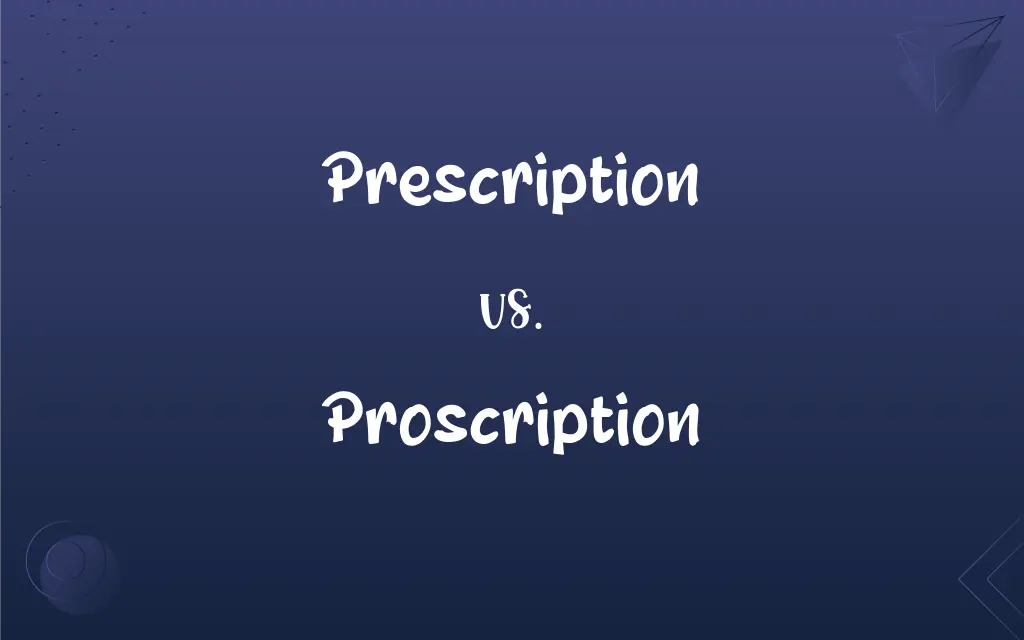Prescription vs. Proscription: What's the Difference?
Edited by Janet White || By Harlon Moss || Updated on November 6, 2023
Prescription is an order for medication or a recommended course of action; proscription is a condemnation or prohibition.

Key Differences
A prescription is typically a written directive by a qualified healthcare professional to authorize a patient to be provided with medicine or treatment. Proscription, however, is the act of forbidding something, often by law or social pressure.
Prescriptions are commonly associated with the field of medicine and health care, offering a remedy or treatment for an ailment. On the contrary, proscription is often used in legal or political contexts, denoting the action of outlawing or banning.
In addition to medication, a prescription can also mean a recommended guideline or practice in various professional fields. Proscription, distinctly different, signifies an authoritative or official forbidding of certain actions or substances.
The word prescription may be used more broadly to suggest any authoritative recommendation, not necessarily medical. Proscription, though, has a negative connotation, implying a restriction or denial imposed by an authority.
A doctor’s prescription aims to provide benefit and promote health, while a proscription typically aims to protect society by preventing harm through the exclusion or rejection of undesirable behaviors or items.
ADVERTISEMENT
Comparison Chart
Definition
Authorization for medication or treatment
Act of forbidding or banning
Usage Context
Medical and advisory settings
Legal, political, and social contexts
Connotation
Positive, suggesting care or advice
Negative, suggesting banishment or denial
Purpose
To provide or recommend treatment
To prevent, restrict, or condemn actions
Grammatical Use
Often used as a noun
Also primarily used as a noun
ADVERTISEMENT
Prescription and Proscription Definitions
Prescription
A doctor’s order for the preparation and administration of a drug.
She filled her prescription at the local pharmacy.
Proscription
A decree that a person is to be banished.
Ancient Rome was known for the proscription of political rivals.
Prescription
A recommendation that is authoritatively put forward.
The prescription for more exercise improved his health.
Proscription
The act of outlawing or banning certain behaviors.
The new law led to the proscription of using plastic bags.
Prescription
A direction, usually written, by a clinician to a pharmacist.
The patient handed the prescription to the pharmacist for her medication.
Proscription
The action of forbidding something.
The proscription of smoking in restaurants was widely supported.
Prescription
A legal right acquired by long-term practice.
The farmer claimed the land by prescription.
Proscription
Official prohibition of an activity or thing.
The government's proscription against dumping waste in the ocean helped protect marine life.
Prescription
A set of instructions given by a physician.
His prescription included taking medication twice a day.
Proscription
A formal condemnation of certain actions.
The organization called for the proscription of unfair trade practices.
Prescription
The action of establishing a rule, law, or direction.
Proscription
The act of proscribing; prohibition.
Prescription
Something that is prescribed; a rule, law, or direction
Prescriptions for living a moral life.
Proscription
The condition of having been proscribed; outlawry.
FAQs
Is "prescription" used legally?
In legal contexts, a "prescription" can mean the acquisition of a right or property by means of a long usage and custom.
Is a prescription always necessary to obtain medication?
Not always; some medications are over-the-counter, meaning they do not require a prescription.
Can "prescription" refer to anything other than medicine?
Yes, it can also mean a recommended course of action or a set of established practices or guidelines.
What does "prescription" mean?
A "prescription" refers to a doctor's written order for the administration of a medicine or treatment to a patient.
How do you pronounce "prescription"?
It's pronounced as /prɪˈskrɪp.ʃən/.
Can "prescription" be used metaphorically?
Yes, it can be used to suggest a remedy or solution for a problem, e.g., "a prescription for success."
Can "proscription" apply to people?
Yes, historically, it referred to condemning or outlawing individuals, often leading to persecution or execution.
Can anyone write a prescription?
No, only a licensed healthcare professional such as a doctor, dentist, or advanced practice nurse can legally write a prescription.
What is the adjective form of "prescription"?
The adjective form is "prescriptive," which can refer to something related to the act of prescribing or inclined to prescribe.
What is a common abbreviation for "prescription"?
"Rx" is a common symbol denoting a prescription.
What does "proscription" mean?
"Proscription" refers to the act of outlawing something or someone, often officially by a decree or law.
Are prescriptions permanent?
Prescriptions are usually for a set duration and may require renewal or reassessment.
What is the origin of "proscription"?
It originates from Latin, "proscriptio," meaning the publication of a person’s name with the intention of outlawing them.
How is "proscription" pronounced?
It's pronounced as /prəˈskrɪp.ʃən/.
Is "proscription" used in modern legal systems?
Yes, but more commonly we use terms like "ban," "outlaw," or "prohibit."
What is the opposite of "proscription"?
The opposite can be "approval," "sanction," or in legal terms, "prescription" in the sense of endorsing a practice.
Does "proscription" have a specific historical context?
Yes, it is notably associated with Ancient Rome, where it was a formalized practice of outlawing citizens.
What is the noun form of someone who is proscribed?
The noun form is "proscript."
Is "proscription" commonly used today?
It’s not as common in everyday language but is used in formal or legal contexts.
What is the adjective form of "proscription"?
The adjective form is "proscriptive," which generally pertains to the act of proscribing, often suggesting an authoritative or dictatorial stance.
About Author
Written by
Harlon MossHarlon is a seasoned quality moderator and accomplished content writer for Difference Wiki. An alumnus of the prestigious University of California, he earned his degree in Computer Science. Leveraging his academic background, Harlon brings a meticulous and informed perspective to his work, ensuring content accuracy and excellence.
Edited by
Janet WhiteJanet White has been an esteemed writer and blogger for Difference Wiki. Holding a Master's degree in Science and Medical Journalism from the prestigious Boston University, she has consistently demonstrated her expertise and passion for her field. When she's not immersed in her work, Janet relishes her time exercising, delving into a good book, and cherishing moments with friends and family.































































